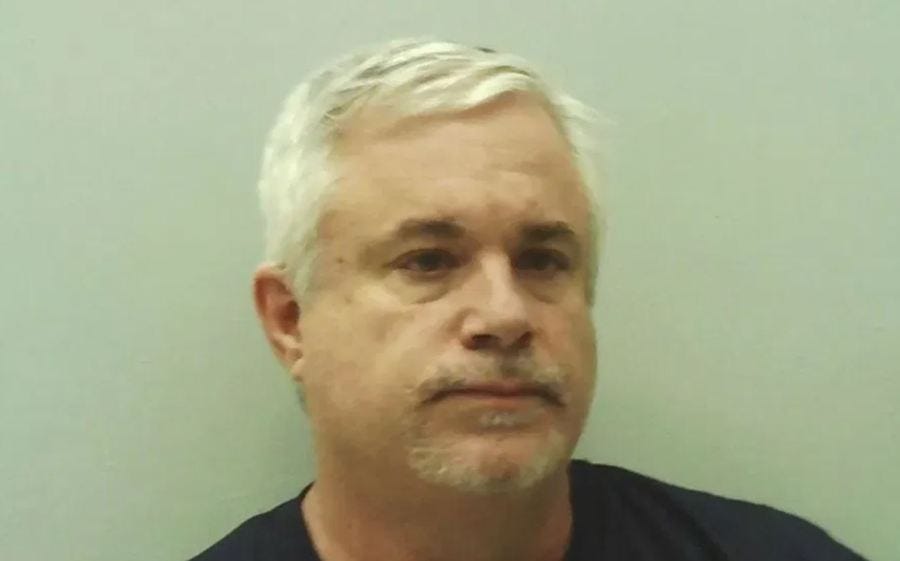Vetting State Board of Ed: Stitt Appointee Brings Major Conflict of Interest, Senate Ed Committee Confirmed Anyway
State Senate to Vote Today: 1:30 PM
Disruptive change seems to be the new normal on Oklahoma’s State Board of Education, as Governor Kevin Stitt (R) upends, removes and appoints members. V1SUT continues to vet Stitt’s recent appointees, as the free press should any public official.
On February 11th, Stitt removed three (3) of his previous appointees to the State Board of Education and immediately appointed Michael Tinney, Ryan Deatherage and Chris VanDehende to those posts.

V1SUT previously reported concerning VanDenhende’s immediate push to stop any talk about the effects or costs of illegal immigration on Oklahoma’s schools and a subsequent effort by the new appointees to control the board’s agenda. The article also outlined potential conflicts of interest concerning VanDenhende’s businesses and Stitt’s recent interest in green energy.
Previous reporting:
Gov Stitt's State Board of Ed Appointee VanDenhende: Good for Education or Tie to Green New Denmark Deal?
·Tomorrow, the Oklahoma Senate is scheduled to consider the nomination of Chris VanDenhende to the Oklahoma State Board of Education. VanDenhende was one of three (3) appointees announced in February as Governor Kevin Stitt (R) upended the board amid a backroom ultimatum and an ongoing conflict with State Superintendent Ryan Walters (R) over education, i…
In flipping the board, Stitt publicly abandoned his previous alignment with State Superintendent Ryan Walters to join a group of mostly Republican state legislators, education NGOs and AG Gentner Drummond in disrupting Walters efforts to remove inappropriate and predatory teachers from the state’s public schools.
During 2024, those legislators sought to infiltrate the board’s executive sessions where sensitive cases of teacher misconduct, often involving the sexual abuse of students, are considered for certification removals.
Walters and the previous collection of board members had voted to suspend and/or revoke an unprecedented number of teacher certifications following investigation by a newly formed unit at the State Department of Education (SDE) staffed with experienced detectives and former members of law enforcement.
The SDE now allows reports of concern or student abuse to flow directly to that unit through its Awareity System, thus bypassing district administrators with a history of concealing or downplaying educator misconduct reports.
Stitt’s new appointees, including one with a direct conflict of interest within that process, and new legislation spurred by their immediate push to control board meeting agendas appear to be working to slow those actions, perhaps putting teacher livelihoods over student childhoods.
State Law Requires Local School Boards to Avoid Conflicts of Interest: State’s Highest Ed Board Ignoring Same Standard
It wasn’t long ago that public servants, elected, paid or volunteer, were expected to avoid even the appearance of a direct conflict of interest within their government roles. These restrictions are not a judgement on character, but rather a time-tested acknowledgement of human nature and the power of personal human relationships to influence situational decision making.
State law acknowledges the need to limit personal relationships within public education decision making and even prohibits local, elected school board members from serving in districts that employ their direct relations.
“no person shall be eligible to be a candidate for or serve on a board of education if the person is currently employed by the school district governed by that board of education or is related within the second degree by affinity or consanguinity to any other member of the board of education or to any employee of the school district governed by the board of education” - Title §70-5-113
Nevertheless, Gov Stitt has added a major conflict of interest to the State Board of Education with his appointment of Michael Tinney.

Senator Lisa Standridge (R-Norman), as the standing State Senator within Michael Tinney’s board district, refused to carry Tinney’s nomination citing concerns about the abrupt removal of grassroots favorite Kendra Wesson amid Stitt’s backdoor dealings (see previous reporting).
Following a similar public refusal, Senate Pro Tempore Lonnie Paxton (R-Tuttle) carried Tinney’s nomination forward claiming in committee he was asked by Standridge.
The explanation for Standridge’s rejection appeared incomplete. V1SUT reached out to her for comment about Tinney’s potential conflicts of interest. Standridge has not responded.
Board of Ed Member Tinney’s Wife Runs Ed Association, Son is Ed Lobbyist, Daughter Does Policy PR for Gov Stitt
Before becoming an oil, gas and probate attorney, Michael Tinney taught history for three (3) years. Tinney’s wife Ginger has been the lead executive for the Association of Professional Oklahoma Educators (POE) for more than thirty years and also serves as registered agent for the Association of Retired POE.
According to the POE’s website, Michael and Ginger Tinney co-founded the related POE Foundation in 1998.
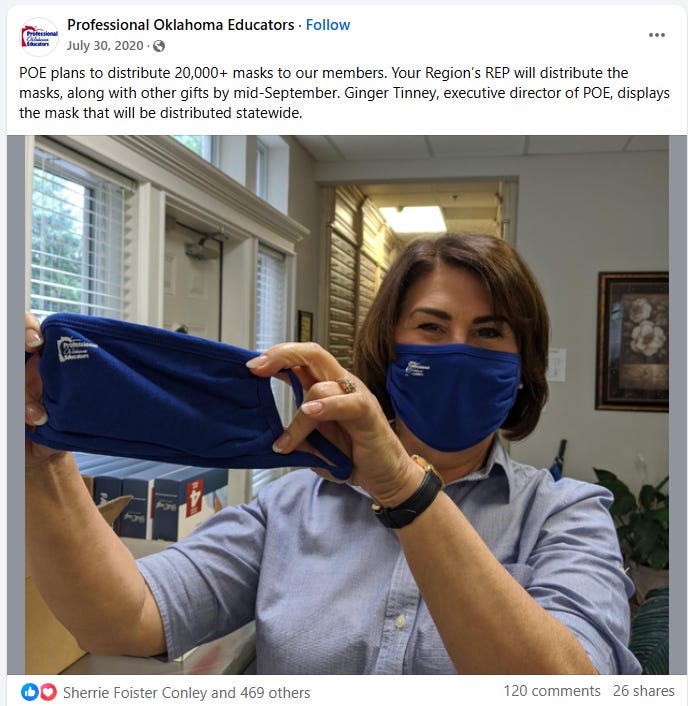
Ginger Tinney and the couple’s son Daniel, and previously their daughter Rachel Ackerman, are registered lobbyists for the POE, making both the organization and the family deeply involved in the politics of public education.
Leading up to Tinney’s nomination by Stitt, his daughter, now an executive coach and certified etiquette consultant, was working directly with Stitt on his “Disagree Better” campaign.

The Disagree Better initiative comes directly from the increasingly progressive National Governors Association (NGA). As other Republican governors have shunned the NGA, Stitt has embraced its policy platforms and currently serves as its vice chair. Next year, he will lead the NGA as chair.
Ackerman publicly lobbied for her father’s confirmation on social media following Sen Standridge’s refusal to carry his nomination. Ginger Tinney publicly reposted at least one of those messages in which Standridge’s stated reasons for her refusal were labeled as “full of lies”.

A recent POE newsletter quoted Ginger Tinney as stating Sen Standridge “values political payback more than serving students.”
POE Provides Legal Services for Teachers Accused of Misconduct: Tinney Will Vote on Those Teaching Certifications
The POE, like the Oklahoma Educators Association (OEA), collects monthly membership dues from educators and, according to its website, provides each member with $2 million in liability coverage, criminal defense reimbursement coverage and representation within employment due process hearings.
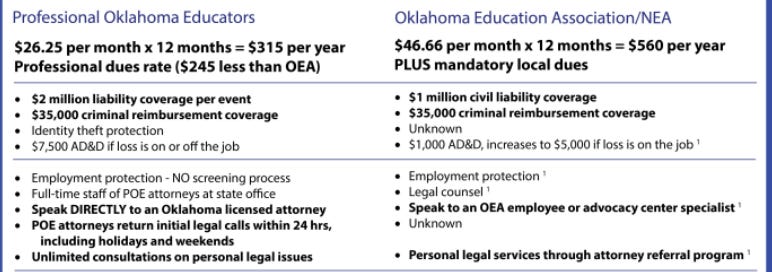
In support of the organization’s civil and criminal defense services for members, the POE claims to have the “largest in-house legal team among all professional education organizations statewide”.
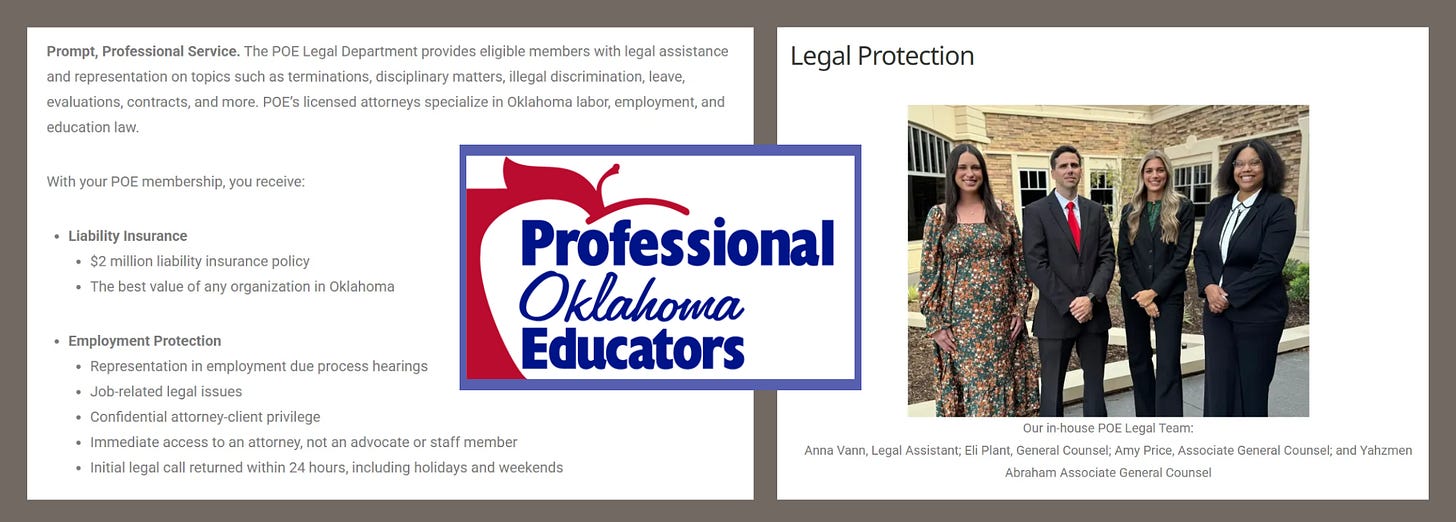
When a POE member is accused of misconduct or abusing a student, the organization is obligated to provide legal defense for that educator under the terms of its membership. Michael Tinney, as a member of the State Board of Education, will review those cases as POE members are considered for potential suspension and/or revocation of their teaching certifications.
Michael Tinney helps present awards to POE members, making this potential conflict of interest further identifiable.
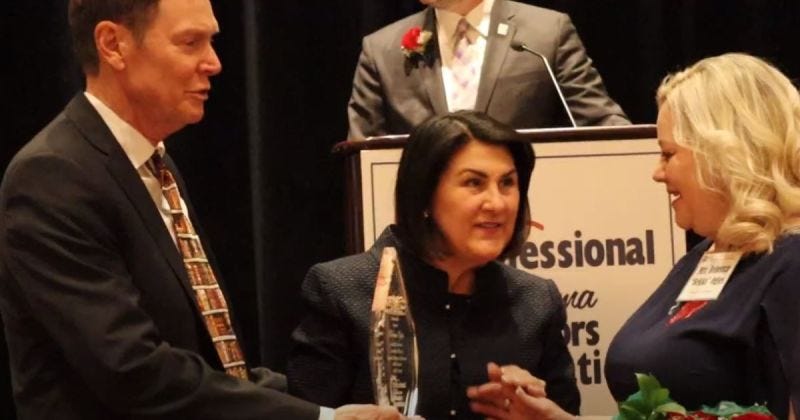
According to 2024 IRS filings, even the POE questions its board members about conflicts of interest on an annual basis.

POE Head Denies Organization Defends Child Perpetrators Despite Obligation to Members
On February 12th, the day after Stitt’s flip of three (3) board seats, this journalist was invited to join the ROPE Report podcast to discuss the changes and begin vetting the new appointees.
Despite multiple verbalizations explaining conflicts of interest are defined by relationships, not character traits, Ginger Tinney used the comment section of the podcast to frame the discussion as an attack on her husband’s character. Her multiple, typed comments stated she and her husband are “parents and grandparents” and described him as a “devout Christian” and “OKC Chapter Leader of Christian Legal Society”.
When the discussion moved to considering potential cases of alleged child sexual abuse related to POE members and how Michael Tinney might be conflicted as his wife’s organization provides legal defense for those individuals, Ginger Tinney labeled the discussion “smack talk” prompting a second listener to offer a differing opinion and a third to seek clarification as to Ginger Tinney’s role.

Ginger Tinney further commented, “We don’t defend child molesters. So wrong. You attack people without talking speaking with them.”

Following the podcast, V1SUT reached out to Ginger Tinney by email on the following day to gain her full perspective on the conversation and ask how the POE handled accusations of student abuse against those paying dues if they “don’t defend” such matters as her comment asserted. Ginger Tinney did not to respond to our inquiry.
POE Defended Now Convicted Child Molester, May Now Keep Defense of Pedophile Educators Distanced from Organization
The case of a now convicted, pedophile teacher/coach suggests the POE likely fulfills its obligation to defend accused members but may more recently be keeping the defense of such cases publicly removed from the organization.
In 2024, tiny Salina Public Schools in Northeast Oklahoma agreed to pay 15 student victims a total of $2.6 million in a civil judgement related to former Northeastern State University head football coach and Salina Middle School teacher/coach John Q. Horner III (61).
According to the civil filing, Horner inappropriately touched girls within the Salina district for years, reports to administrators were dismissed, internal investigations consistently failed to find any wrongdoing by Horner and victims were silenced.
Horner’s pattern of behavior was so well known that students referred to him as Horny Horner. Horner was removed from the classroom in 2020 after law enforcement began investigating in 2019.
In August of 2024, Horner was criminally convicted on nine (9) counts of lewd molestation and sentenced to just seven (7) suspended years and only 14 days in jail.
Within the civil case, Horner was represented between May of 2021 and February of 2024 by attorney Blake Sonne.

According to Sonne’s LinkedIn resume, he served as general counsel for the POE from October of 2006 until January of 2024. Sonne’s legal name is William Blake Sonne. 2024 IRS filings show the POE (EIN: 73-1512320) paid William Sonne as an employee of the POE during the time he was defending Horner in the federal civil case.

William “Blake” Sonne practices law individually out of Norman, as well as through Whitten Barrage in Oklahoma City since leaving the POE during 2024. A source close to the POE informs the organization now contracts with outside counsel to defend members accused of student abuse.
Sen Deevers Vets Appointee: Tinney Admits Likely Discussing Case Before Board with Wife, Plans to Use POE Lawyers and POE Lobbyist as Resources for Board Work
Last Tuesday, Board of Education nominees Michael Tinney, Ryan Deatheridge and Becky Carson were presented before the Senate Education Committee. Typically, Stitt’s nominees fly by the UniParty led committee with heaping congratulations and little vetting.
In contrast, Tinney faced thorough questioning by Sen Dusty Deevers (R-Elgin) concerning the conflict of interest presented by his family’s role at the POE. (Link to video: Timestamp 11:55 to 12:32).

The session glaringly reveals the divide between Oklahoma’s few Republican legislators who attempt to govern with fidelity and the corrupted majority in more powerful positions.
Early in the session, Tinney revealed that upon initial contact from Governor Stitt’s office concerning his potential nomination, he had presented his wife’s role at the POE as a potential conflict of interest. Stitt moved forward anyway.
During vetting by Deevers, Tinney repeatedly framed the POE as a resource he would be turning to for guidance in interpreting policy, legal situations and legislation within his role on the State Board of Education.
“I actually think POE is a great resource,” stated Tinney. “I can tap into that resource. I can, if there’s an education policy or statute enacted, I can go see how that plays out on the ground. And I can take that back to the board.”
Tinney continued, “There’s outstanding legal attorneys there (POE) that know education law very well. I can ask questions of them. So that’s a tremendous resource.”
In reference to his son Daniel, a lobbyist for POE, Tinney said, “I think my son is a very astute political analyst in my view. I think again its helpful, we can talk about bills. He knows more about a lot of those bills than I do. We can talk about those bills and discuss them. I can bring that knowledge to the board. I can base my decisions on that knowledge. I think that’s a very good thing.”
Deever’s also asked Tinney about his motion to stop the suspension of teacher Kaytlin Fultz at the April meeting of the State Board of Education. A video of a 7-year-old foster child in the care of Fultz’s family being locked outside in frigid temperatures without shoes or a coat circulated widely on social media. Law enforcement became involved and charges were filed against Fultz and her spouse.
On May 6th, V1SUT requested clarification from Tinney on his motion related to Fultz and potential conflicts of interest involving the POE. Tinney did not respond.
During questioning, Tinney could not say whether Fultz was a POE member but revealed potential challenges in limiting the flow of sensitive board information between himself and his wife.
Deevers - “Was Fultz a POE member?”
Tinney - “I don’t know, no, I don’t think so.”
Deevers - “Have you ever discussed the Fultz case or similar cases with your wife?”
Tinney - “Probably in general because she’s my wife. I do not go into details that were discussed in the executive session.”
Deevers - “What safeguards are in place to ensure sensitive information would not make it back to your wife who may represent some of those educators?”
Tinney - “Well, number one, our materials stay there at the meeting, they take those up after the meeting, so we don’t have that. So we don’t have any of the written materials, any of the evidence, any of the findings of the investigators. We cannot take that with us, which I think is probably a good idea. The other thing is, I guess it’s just my personal integrity or ability to not go out and blab things that went on in executive session. Some things are public as is the lady’s name that you’re mentioning. There are some things out there that are public about her, people that watch the news may know that but I don’t, to go beyond that, to go into detail, I would not do that or I hope I would never do that, what goes on in executive session. I try to be careful. Sometimes it’s hard. You’re talking to your spouse. I try to watch that very carefully.”
Deevers asked about recently introduced legislation seeking to weaken the role of the only elected member of the State Board of Education and his wife’s comments about Sen Standridge.
Deevers - “POE has actively lobbied for SB646 and that bill was directly related to reforming the state board. Do you recognize any conflict of interest here?”
Tinney - “No, I’m not lobbying on that bill. I don’t, I mean, I guess I have an opinion on that bill. I would not see a conflict.”
Deevers - “A POE newsletter quoted your wife stating that Senator Stanridge, who previously was supposed to carry your nomination but didn’t, ‘values political payback more than serving students’. Do you endorse this statement?”
Tinney - “Everyone’s entitled in their opinion. I was disappointed in this, I say disheartened by her position. I have tried, if you read the press, not to say anything really derogatory or detrimental. I went in and talked to her about it personally, it was a professional conversation, and I kind of, I said you know there’s a lot of people that are going to get upset one way or the other on this and say a lot of things. I’m going to try not to be one of those people. I will say, my wife is a great defender of me and vice versa.”
Deevers’ questioning of Tinney was then cut off by committee chair Sen Adam Pugh (R-Edmond).
When Sen Kendal Sacchieri (R-Blanchard) asked his thoughts on the role of a parent in the school system, Tinney largely framed parents as the problem in public education.
Tinney seemed unaware of the role of school administrators within Oklahoma’s epidemic of child sexual abuse, harmful district policies that dismiss allegations through internal investigations, or the practice of passing the trash to other districts by allowing accused educators to resign.
According to Tinney, “The school has the opportunity to suspend the teacher from their position and send them home. Local control. They know the people in the community. They can take action.”
Deevers recap during committee debate was the only direct recognition of the observable conflict of interest related to Tinney’s service on the State Board of Education.
Deevers - “I think there is too severe a conflict of interest for me to approve this. This is not statement about POE as an entity or their efforts. It has nothing to do with them. I am just thoroughly convinced in my mind, in my conscience, that due to the nature of this conflict of interest that it’s too strong, it’s too severe. I don’t believe that that’s what would best serve our children and our state. Especially considering you do love your wife and children, appropriately so. The decisions that are put before you, that will affect our state.
With POE being a union representing thousands of teachers in our state, there is too much, too great of an opportunity for it to have undo influence. And I understand, you could respond and say, I’m a professional, I’m an attorney, I can separate those things. But I think, as hard as you will try, I think that that flow of information and the flow of decision making and the flow of knowledge, is too entrenched. And again, this is not about you and your character. It is a statement about keeping these decisions free and clear from these conflicts and that’s why I will be a no today.”
In lieu of actual debate, Sen Pugh, with familiarity, pointed out Tinney’s son and daughter who were in attendance, stating “I see your daughter Rachel Ackerman who’s here and your son Daniel. I don’t see your wife.”
After the session, Ackerman publicly posted a photo of herself and Stitt’s Secretary of Education Nellie Tayloe Sanders being greeted outside of chambers by Pugh.
To close debate, Pro Temp Paxton suggested that identifying any conflict of interest concerning Tinney’s service on the State Board of Education might require the legislature to “look at the mirror”.
Paxton - “This situation is not a conflict at all. This is a situation where family members are involved in the same industry that this board kind of regulates as far as from the standpoint of they get to look at what’s going on out there, decide what’s important and decide what’s the right policy to move forward. This is not a conflict. I just want to make sure that’s clear that if we’re gonna start pointing the conflict finger, we can point at ourselves the first thing. So, that is something that we need to look at as we move forward. That’s not what this is.”
In the end, the committee voted 9-2 to approve Tinney’s nomination for a full vote in the Senate. State Board of Education appointees Ryan Deatheridge (9-2) and Becky Carson (11-0) also advanced to a Senate vote during the same session.
The Senate will convene today at 1:30 pm to consider all three nominations.
Have a tip or information you’d like to share? Comment publicly to this post or email privately (connect@v1sut.com).
Copyright Notice: Individual readers are encouraged to share this original content. Others, including publications, aggregators and social media outlets not operating as an individual must request and receive written permission from The V1SUT Vantage before using this content in whole or in part. Email connect@V1SUT.com to request permission.











